Most humans are naturally repulsed by insects. The mere sight of some types of bugs (i.e. cockroaches) generates in most people an instant feeling of disgust, while some succumb to outright panic and horror.
This near-universal trait in humans is believed to be instinctual. Our natural inclination to yell “NOPE” when a bug is anywhere near us could be our brains warning us that these things could bite, sting, infect or even poison us to death. Also, considering the fact that some insects feed on filth, decay, and excrement, the mere sight of them is enough for our brains to send an alarm signal telling us that something is wrong.
With all of that being said, the global elite (most notably the World Economic Forum) wants us to put cockroaches in our mouths, chew on their crunchy exterior, and swallow their viscous green interior. Indeed, the bug-eating agenda is seeping through mass media and even the educational system. The goal: To normalize and even glamorize the consumption of bugs.
Some might say that several cultures eat bugs. That is correct. However, many others consider bug eating a complete abomination. If I told my Lebanese grandmother that I wanted to eat cockroaches for dinner, she would grab her old-school wooden sandal and she would throw it right at my face.
So why are the powers that be laser-focused on the entire globe eating crickets, mealworms, and cockroaches? Here’s a look at the situation.
To fully understand why the elite wants us to eat bugs, we must first wrap our heads around one important fact: They’re looking to redefine what it means to be a human on Earth. They believe that we have too many freedoms and that we consume too many resources.
At the forefront of this movement is the World Economic Forum (WEF). In my article titled The Top 10 Creepiest and Most Dystopian Things Pushed by the World Economic Forum (WEF), I listed the many ways the elite-owned organization is looking to shape the future of humanity.

A WEF propaganda video that proudly states: “You’ll own nothing. And you’ll be happy”.
The WEF is not merely trying to control governments and economies, it wants to redefine the meaning of life on Earth. Nothing less.

An article on the WEF’s actual website. They’re out of their minds.
In short, they see us as cattle. Other than restricting every aspect of our lives, they also want us to consume much fewer resources. This is where the bug-eating agenda comes in. Using buzzwords such as “sustainability”, the global elite is defining what is a “responsible” diet while increasingly shaming those who eat meat.
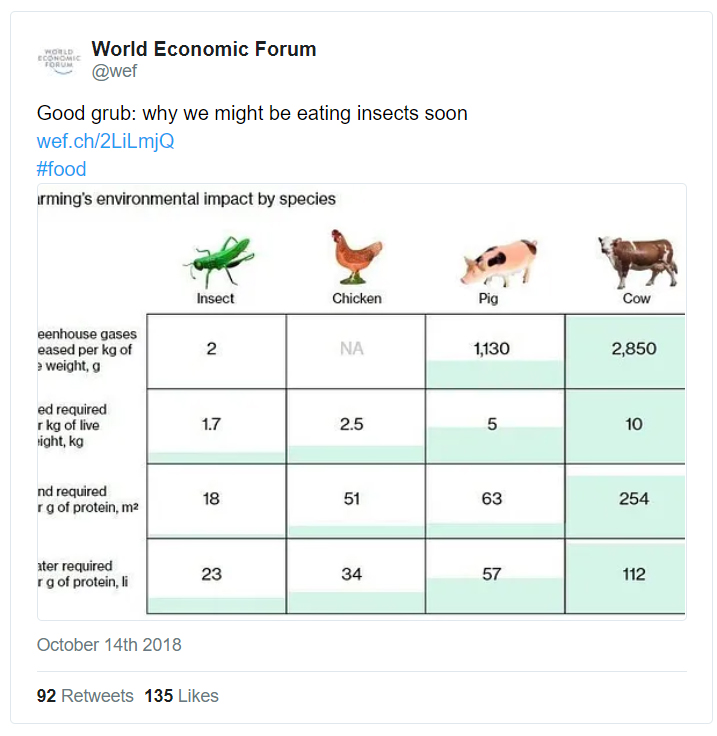
A tweet by the WEF’s official account promoting bug-eating using a graph showing resource consumption of livestock.

Another WEF article promoting bug eating as an inevitability.
Other than trying to appeal to the environmentally conscious using graphs and figures, the elite is in full indoctrination mode to promote bug eating.
Several years ago, this site identified the gender-blurring agenda and predicted that it would be gaining steam. The least one can say is that was an understatement. Using mass media, schools, and sold-out governments, the elite made the gender-blurring agenda a priority and managed to redefine what means to be a man and a woman.
Well, the bug-eating agenda is on a similar path. Celebrities are eating bugs on camera.”Journalists” are writing articles promoting bug-eating as an inevitability. Schools are making children eat bugs in class. Here are some examples.
First, here’s a creepy video of Nicole Kidman eating live insects which she calls “micro-livestock”.
Yup, a big movie star was enlisted to semi-seductively eat insects on camera to convince you to do the same. This is cringy propaganda 101. Fortunately, the YouTube comments give us hope. Here are the top ones.
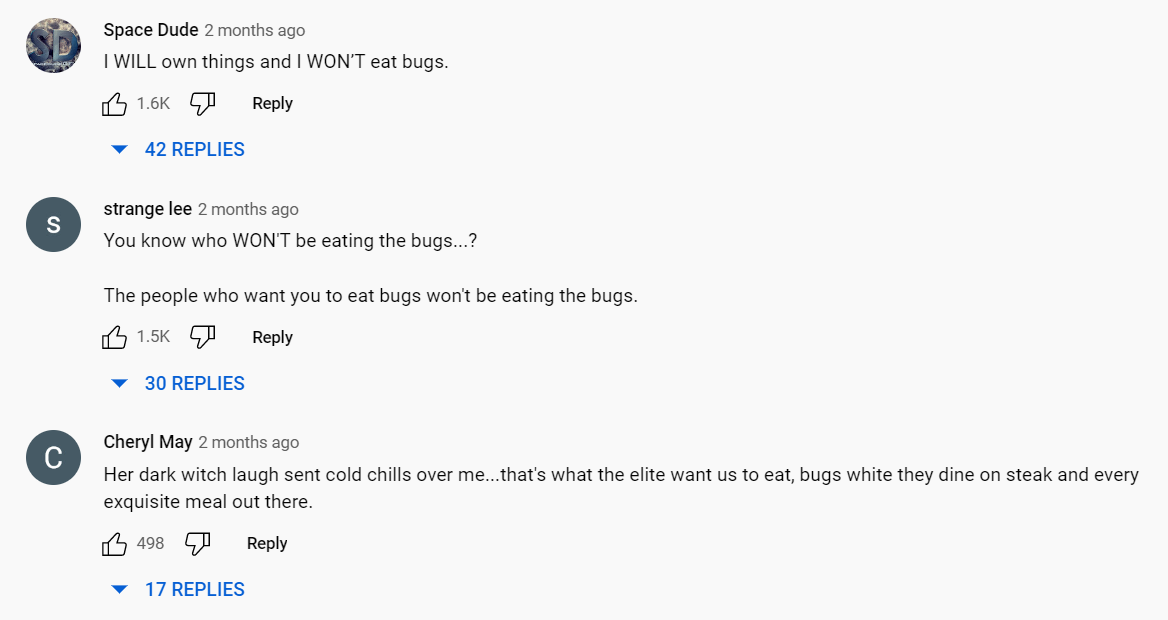
One movie star is not enough. They need many. Here’s Lupita Nyong’o using her acting skills to GO CRAZY over eating ants.
Other than using celebrities, the elite likes to use the “news”. As you probably know, a great number of “news” articles are actually thinly veiled attempts at propaganda.
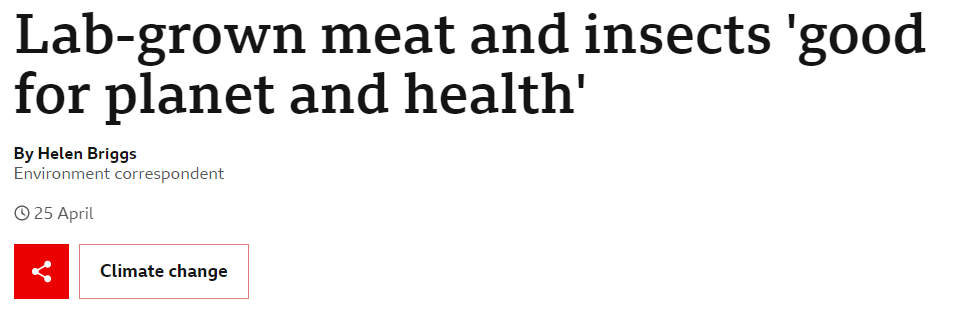
A headline from the BBC.
There are a few things to note about the headline above. First, the push for synthetic “meat” is part of the same exact agenda. Second, this article was written by an “environment correspondent” and is filed under “climate change” as a topic. This is the angle taken to coerce and shame the world into adopting a diet based on insects and synthetic foods.

An article by the elite-owned The Economist promoting exactly the same diet: Insects and lab-grown meat.
Of course, the elite knows very well that indoctrination is most effective on young people. It is during their formative years that humans adopt habits that will follow them for the rest of their lives. For this reason, the bug-eating agenda is infiltrating schools worldwide.
In the following video, children are temporarily allowed to remove masks … to eat crickets. They’re creating a compliant, WEF-friendly generation.
Brainwashing in real time! pic.twitter.com/R6Ayk2ZFMI
— Dr Shawn Baker 🥩 (@SBakerMD) August 18, 2022
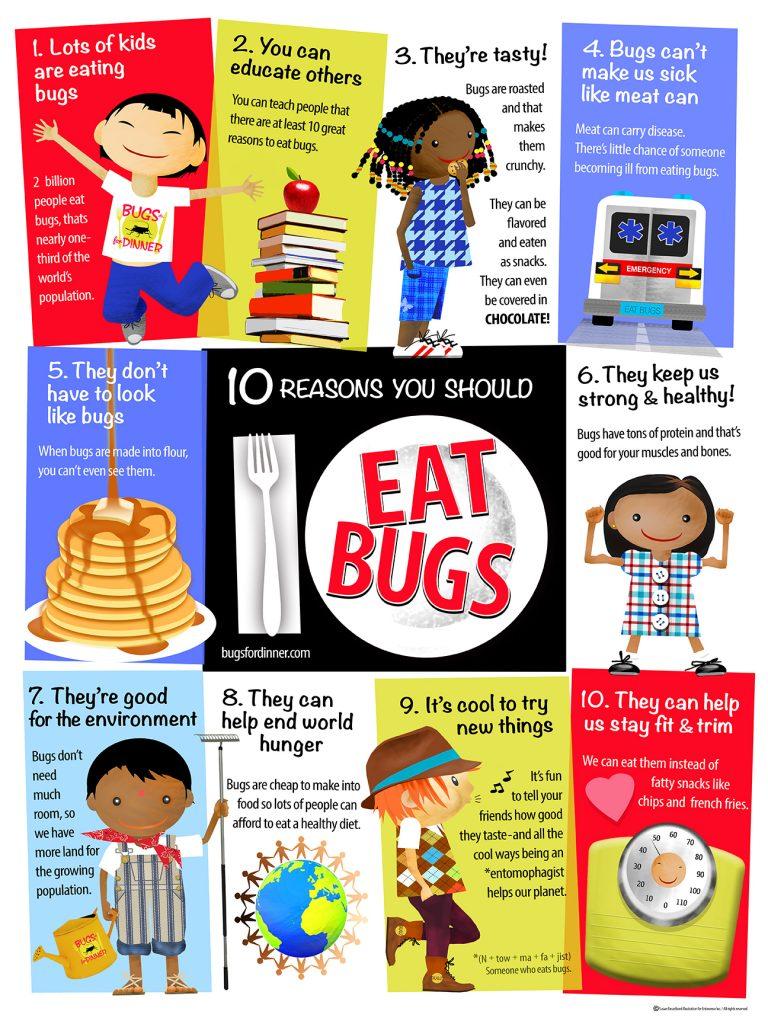
This poster is plastered in California public schools.
The poster above was specifically created to manipulate children into eating bugs. Using cheap psychological tactics, the poster uses arguments such as “everybody’s doing it”, “you can dip them in CHOCOLATE” and “it makes you cool”. Also, it argues that “meat carries disease” and “makes you sick”.
Apparently, insects cannot make you sick. That’s what the propaganda says. Let’s look at what the science says.
The powers that be are laser-focused on humans consuming a specific set of insects namely mealworms, house crickets, cockroaches, and migratory locusts. Considering the wide range of potential foods that can be consumed by humans, why are they focusing on these few – and particularly disgusting – species? Is it truly because they are “sustainable” … or is there a more nefarious reason behind it all?
If one steers away from the obvious propaganda and looks into the scientific research conducted in the past decades, some worrying facts quickly surface. The main one: Insects are toxic.
A 2019 study titled A parasitological evaluation of edible insects and their role in the transmission of parasitic diseases to humans and animals states the following:
From 1 January 2018 came into force Regulation (EU) 2015/2238 of the European Parliament and of the Council of 25 November 2015, introducing the concept of “novel foods”, including insects and their parts. One of the most commonly used species of insects are: mealworms (Tenebrio molitor), house crickets (Acheta domesticus), cockroaches (Blattodea) and migratory locusts (Locusta migrans). In this context, the unfathomable issue is the role of edible insects in transmitting parasitic diseases that can cause significant losses in their breeding and may pose a threat to humans and animals. The aim of this study was to identify and evaluate the developmental forms of parasites colonizing edible insects in household farms and pet stores in Central Europe and to determine the potential risk of parasitic infections for humans and animals. The experimental material comprised samples of live insects (imagines) from 300 household farms and pet stores, including 75 mealworm farms, 75 house cricket farms, 75 Madagascar hissing cockroach farms and 75 migrating locust farms. Parasites were detected in 244 (81.33%) out of 300 (100%) examined insect farms. In 206 (68.67%) of the cases, the identified parasites were pathogenic for insects only; in 106 (35.33%) cases, parasites were potentially parasitic for animals; and in 91 (30.33%) cases, parasites were potentially pathogenic for humans. Edible insects are an underestimated reservoir of human and animal parasites.
In short, 30% of the farmed insects evaluated by the study contained parasites that are harmful to humans. The full study describes each parasite that was discovered and noted that they were particularly harmful to the gut and lungs.
Other studies focused on chitin – a natural structural component found in insects’ exoskeletons. The 2007 study Chitin induces accumulation in tissue of innate immune cells associated with allergy states:
Antigens associated with insects, crustacea, helminths and fungi make up a considerable proportion of the environmental antigens associated with allergies and asthma in humans. Nonetheless, the common elements that link these widely distributed entities remain unknown. A major culprit might be chitin. Chitin is the second most abundant polymer in nature, providing the osmotic stability and tensile strength to countless cell walls and rigid exoskeletons. Reese et al. have now found that mice treated with chitin develop an allergic response, characterized by a build-up of interleukin-4 expressing innate immune cells. Occupations associated with high environmental chitin levels, such as shellfish processors, are prone to high incidences of asthma, suggesting that this pathway may play a role in human allergic disease.
In other words, the study found that chitin causes an allergic reaction in humans. Maybe that’s our bodies way of telling us that we shouldn’t eat the exoskeleton of insects.
Another study about chitin concludes:
Chitin, a polysaccharide constituent of many allergens and parasites, initiates innate type 2 lung inflammation through incompletely defined pathways.
A study focusing on chitosan – a chemical compound made from chitin – discovered that its consumption leads to the depletion of vitamins in the human body, which leads to disastrous effects.
There were no histologic changes associated with the observed decreases in vitamin levels; however, the decreases were significant enough to suggest nutritional inadequacies. The long-term effects of vitamin A and vitamin E deficiencies are well-known, and it is unknown what deficiency-related effects would have been observed had these decreased levels been maintained for a longer period of time. When circulating levels of vitamin E, specifically α-tocopherol, are depleted, tissue damage can occur. Vitamin E depletion in humans has subsequently been correlated with anemia, disruption of normal growth, decreased responses to infection, and pregnancy concerns. Vitamin A is essential in numerous biological processes and pathways, including growth, vision development, immune function, and metabolism. Severe vitamin A deficiency (VAD) results in disruption of normal tissue function and is associated with childhood blindness, anemia, and depressed responses to infection; VAD during a severe infection may result in death. While the long-term effects of vitamin deficiency in rodents are not as well understood, the available literature on human deficiencies suggests that the decreases in vitamin A and E observed in this study may be detrimental over time.
As if that wasn’t enough, here’s a headline from LiveScience.

While insects might show good nutritional value on paper, they might be outright toxic to the human body. Studies found that they can harbor parasites, affect the immune system, trigger allergies, and deplete vitamins from the body. Despite these glaring issues, the elite is going full-steam ahead with this agenda.
As the masses are being pushed towards the consumption of insects and synthetic products, some odd events are happening around the world directly affecting the food supply.
In the Netherlands, the government engaged in a war with livestock farmers because of “pollution”. The goal: To reduce the number of pigs, cattle, and chickens by over 30%.
Dutch government proposals for tackling nitrogen emissions indicate a radical cut in livestock – they estimate 11,200 farms will have to close and another 17,600 farmers will have to significantly reduce their livestock.
Other proposals include a reduction in intensive farming and the conversion to sustainable “green farms”.
As such, the relocation or buyout of farmers is almost inevitable, but forced buyouts are a scenario many hope to avoid.
The cabinet has allocated €25bn to slicing nitrogen emissions within the farming industry by 2030, and the targets for specific areas and provinces have been laid out in a colour-coded map.
– Anna Holligan, Why Dutch farmers are protesting over emissions cuts
If the supply of meat goes down drastically, prices will go up drastically. This would open the way to insect farming coded as “sustainable green farms” in the article.
In the United States, an unusual number of food processing plants have burned down in the past months.

A compilation of headlines about food processing plants being destroyed.
This caused some people to wonder: “what on earth is going on?”.

A headline from the Women’s magazine Elvie.
Meanwhile, Bill Gates officially became America’s largest private farm owner with some 269,000 acres across dozens of states.

There’s a war against small, independent and self-reliant farmers.
There are lots of speculations surrounding Bill Gates’ farmland grab in America. Why is he buying so much farmland? A look at the official website of the Bill and Melinda Gates Foundation provides some clues.
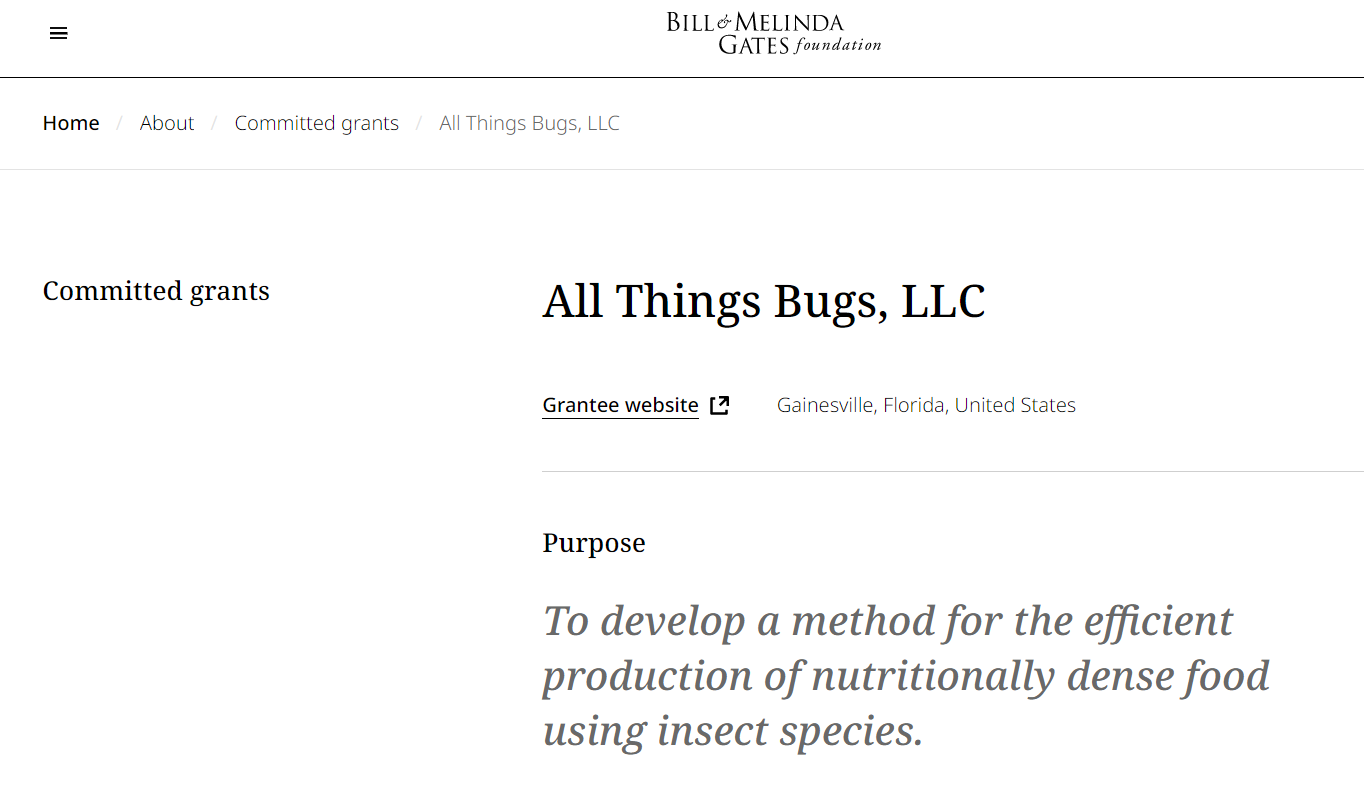
The Bill and Melinda Gates Foundation offered a grant to “All Things Bugs” a company that specializes in the production of insect-based foods.
Whether these facts are all part of a cohesive plan or not, they all lead us towards an increased rarity of meat and an increased supply of insects and synthetic foods.
In the past months, we’ve witnessed the emergence of the bug-eating agenda. Using mass media and the educational system, the world elite is in full indoctrination mode to convince the world that crickets, locusts, cockroaches, and mealworms need to become an important part of our diet. The buzzwords used are sustainability, global warming, and pollution.
This call for a drastic change in food production is part of a wider plan by the WEF to completely reframe the human experience on Earth. They want the masses to be content with less as a growing number of resources will be deemed a luxury.
Furthermore, the bug-eating agenda might have an even darker motive. As shown above, countless studies documented the adverse effects of insects on the human body. Farmed insects can contain parasites harmful to humans, weaken the immune system, trigger allergies, and even deplete vitamins from the body. What better way to create a generation that is even more dependent on big pharma and, of course, vaccines?
Beyond all of this, there’s a near-spiritual component to it all. Considering the fact that humans are naturally aversed to insects, why are they insisting on us ingesting them? Because, to them, bad is good.
The Elite is Desperately Trying to Convince You to Eat Bugs. Here’s Why.






